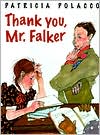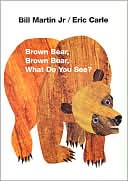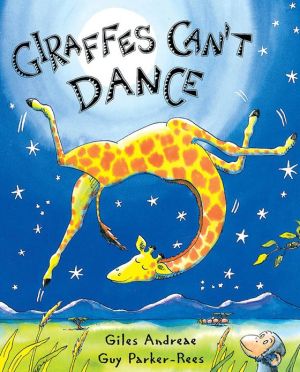Thank You, Mr. Falker
Patricia Polacco is now one of America's most loved children's book writers and illustrators, but once upon a time, she was a little girl named Trisha starting school. Trisha could paint and draw beautifully, but when she looked at words on a page, all she could see was jumble. It took a very special teacher to recognize little Trisha's dyslexia: Mr. Falker, who encouraged her to overcome her reading disability. Patricia Polacco will never forget him, and neither will we.\ \ Now this...
Search in google:
Patricia Polacco is now one of America's most loved children's book writers and illustrators, but once upon a time, she was a little girl named Trisha starting school. Trisha could paint and draw beautifully, but when she looked at words on a page, all she could see was jumble. It took a very special teacher to recognize little Trisha's dyslexia: Mr. Falker, who encouraged her to overcome her reading disability. Patricia Polacco will never forget him, and neither will we.Now this inspiring story is available in a deluxe slipcased edition with a personal letter to readers by Patricia Polacco. Thank You, Mr Falker will make a great end-of-year gift for the special child who needs encouragement-or any special teacher who has made a difference in the child's life.Publishers WeeklyFans of Polacco's (Thundercake; Pink and Say) work know well her talent for weaving her colorful family history throughout her picture books. Here Polacco shares her childhood triumph over dyslexia and discovery of reading in an inspiring if slightly formulaic story. Young Trisha is eager to taste the "sweetness of knowledge" that her grandfather has always revered (here symbolized by drizzling honey onto a book and tasting it, which harkens back to Polacco's earlier The Bee Tree). But when she looks at words and numbers, everything is a jumble. Trisha endures the cruel taunts of classmates who call her "dumb," and falls behind in her studies. But finally the encouragement and efforts of a new fifth grade teacher, Mr. Falker, trigger a monumental turning point in Trisha's life. She begins to blossom and develop all of her talents, including reading. Polacco's tale is all the more heartfelt because of its personal nature. Young readers struggling with learning difficulties will identify with Trisha's situation and find reassurance in her success. Polacco's gouache-and-pencil compositions deftly capture the emotional stagesfrustration, pain, elationof Trisha's journey. Ages 5-up. (Apr.)
\ Publishers Weekly\ - Publisher's Weekly\ Fans of Polacco's Thundercake; Pink and Say work know well her talent for weaving her colorful family history throughout her picture books. Here Polacco shares her childhood triumph over dyslexia and discovery of reading in an inspiring if slightly formulaic story. Young Trisha is eager to taste the "sweetness of knowledge" that her grandfather has always revered here symbolized by drizzling honey onto a book and tasting it, which harkens back to Polacco's earlier The Bee Tree. But when she looks at words and numbers, everything is a jumble. Trisha endures the cruel taunts of classmates who call her "dumb," and falls behind in her studies. But finally the encouragement and efforts of a new fifth grade teacher, Mr. Falker, trigger a monumental turning point in Trisha's life. She begins to blossom and develop all of her talents, including reading. Polacco's tale is all the more heartfelt because of its personal nature. Young readers struggling with learning difficulties will identify with Trisha's situation and find reassurance in her success. Polacco's gouache-and-pencil compositions deftly capture the emotional stagesfrustration, pain, elationof Trisha's journey. Ages 5-up. Apr.\ \ \ \ \ Children's Literature\ - Marilyn Courtot\ Once again Polacco draws upon her own experiences, this time to tell the story of a young girl who suffers with a learning disability. Because she is not able to read, Trisha is taunted by her classmates and called dumb. She starts to lose confidence and thinks that perhaps she really is a dumbbell. Finally, a new sixth grade teacher, Mr. Falker, diagnoses that she has a learning disability. With his help and that of a reading teacher, Trisha finally begins to read. The warm relationship with her grandparents and her talent for drawing are showcased. What does seem a bit strange is that so many teachers did not recognize the problem, and that it was even missed by her own mother (who was also a teacher). Nonetheless, it is a moving tribute and really brings home the message that teachers can and do make a difference in their students' lives.\ \ \ Children's Literature\ - Jan Lieberman\ Trisha loved to draw. At school the other kids watched her perform her magic with crayons. When it came to reading, Trisha always failed. Finally, in fifth grade, Mr. Falker came into her life and helped her overcome her problem. The author writes from her personal experience about a teacher who appreciated her strengths and helped her overcome her weaknesses. We feel Trisha's pain and see her growth. The paintings are emotionally rich. A teacher can change a child's life as this inspiring story clearly demonstrates.\ \ \ \ \ Children's Literature\ - Susie Wilde\ Mr. Falker notices, acknowledges and names Patricia's learning difficulties with compassion. He is willing to pay for a tutor, thus unlocking the world of words for her. The book falls down in one particular way. While Polacco tells how the secret of her learning difficulties is hidden, again and again her peers mock her "dumbness." Still the book honors a fine teacher and by extension those who go above and beyond to care for their students. This serves as a tribute to her teacher, for Polacco herself was profoundly learning disabled. This would make a great teacher gift.\ \ \ \ \ School Library JournalK-Gr 4Once more Polacco shares a personal story with engaging results. This moving saga of her struggle with a learning disability makes an inspiring picture book. Young Tricia wants desperately to read but when she starts school she finds that the words "wiggle" on the page. Teased by her classmates, she retreats into dreams and drawings. It's not until the family moves to California and Tricia has managed to reach the fifth grade that a new teacher finally recognizes her pain and distress. What's more, he does something about it. Without belaboring the point, the author clearly shows the ways that children internalize critical comments made by others and suffer for their differences. This touching story is accompanied by illustrations in Polacco's signature style. Youngsters, as well as adults, may find themselves choked up at the emotions so eloquently described in words and pictures. Yet, like the tears young Tricia cries at the end of the book, these are ultimately tears of joy. Thank you, indeed, Mr. Felker (the real name of the teacher involved) for making it all possible. Readers will be grateful for the chance to recognize, appreciate, and share in Polacco's talent and creativity.Lisa Dennis, The Carnegie Library of Pittsburgh, PA\ \ \ \ \ Kirkus ReviewsAn autobiographical tribute to Polacco's fifth-grade teacher, the first adult to recognize her learning disability and to help her learn to read. Trisha begins kindergarten with high hopes, but as the years go by she becomes convinced she is dumb. She can draw well, but is desperately frustrated by math and reading. In fifth grade, Mr. Falker silences the children who taunt Trisha, and begins, with a reading teacher, to help her after school. A thank-you to a teacher who made a difference is always welcome, but this one is unbearably sentimental. Although the perspective is supposed to be Trisha's, many sentences give away the adult viewpoint, e.g., "She didn't notice that Mr. Falker and Miss Plessy had tears in their eyes." The extent to which Trisha limns her own misery and deifies Mr. Falker (complete with a classroom version of a "He who is without sin among you" scene) is mawkish. Mr. Falker's implicit sense of fairnessþ"Right from the start, it didn't seem to matter to Mr. Falker which kids were the cutest. Or the smartest. Or the best at anything"þis contradicted when Trisha is the object of praise: Mr. Falker, watching her draw, whispers, "This is brilliant absolutely brilliant. Do you know how talented you are?" Polacco's disdain for all the other teachers and the students intrudes on Trisha's more profoundly heartbreaking perspective; the book lacks the author's usual flair for making personal stories universal. (Picture book. 5-9)\ \



![Tickle Monster Laughter Kit [With Tickle Mitts] Tickle Monster Laughter Kit [With Tickle Mitts]](/application/data/covers/98/35/9781932319835.jpg)




